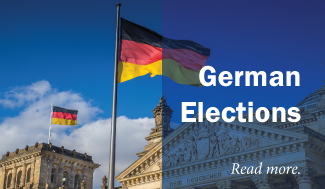Hear From the Candidates: Jens Spahn
Jens Spahn is a candidate in the federal elections from the Christian Democratic Union (CDU) and currently Parliamentary State Secretary at the German Federal Ministry of Finance.
 Q: What do you envision for Germany in the next decade and what goals are you setting for the next four years?
Q: What do you envision for Germany in the next decade and what goals are you setting for the next four years?
Germany is doing better than ever: the economy is booming, wages and pensions are rising, tax revenues are buoyant. It is therefore important that we make the right decisions today, so that we remain successful in the future. After Japan, Germany is the second oldest country in the world and has one of the lowest birth rates worldwide. At the same time, we have a strong welfare system. We would like to keep this standard in the future. For that we need growth, jobs, and innovation. Unfortunately, we have become lazy in some areas. In the next four years, we want to reduce taxes, especially for the middle class, to modernize our infrastructure and to avoid taking on new debt. Simultaneously, we need to make considerable progress with regards to digitalization — both in the private and public sector.
Q: Europe has faced many tests over the past couple of years. How do you view Germany's relationship with and role within the EU?
All in all, we weathered the crises of the past years well. Unfortunately, the U.K. decided to leave the EU. However, we should view this as a chance to look ahead. In addition to trade issues, the EU needs to cooperate more closely on securing its borders, on development aid, and on defense policy. The EU budget needs to be given clearer priorities and aligned toward these challenges. Regarding the future of the monetary union, we need to avoid creating potential false incentives. However, there are also responsibilities which are better kept at the national level. Why does the EU need to co-finance bicycle lanes in my home town? I am convinced: If we manage to overcome these challenges and to give Europe a new meaning, we will be on the right path. In order to get there, we need to emphasize the benefits of the EU. Indeed, the young generation is much more European than we think. That is why it is so important that the benefits of cooperation remain permanently visible.
Q: Many people, perhaps most notably U.S. President Donald Trump, have expressed skepticism toward the traditional partnership between Europe and the United States. What does the transatlantic relationship mean for you today?
The United States will always remain our closest ally and partner outside the EU. Unfortunately, there is also wide-spread skepticism toward the U.S. within the EU. This is a shame since the transatlantic partnership is much more than just cooperation on security matters. We are culturally very close, we share the same interests, and uphold the same values. This alone is reason enough to stand together. We also need to emphasize more than ever, that the United States is a diverse and pluralistic country just like Germany, which cannot merely be reduced to one person. In a successful transatlantic relationship, it is important to discuss problems without questioning whether the two countries still stand on common ground. And we will do this. In the end, everyone — be it in the United States or in Europe — will come to realize that working together is better than just criticizing each other.